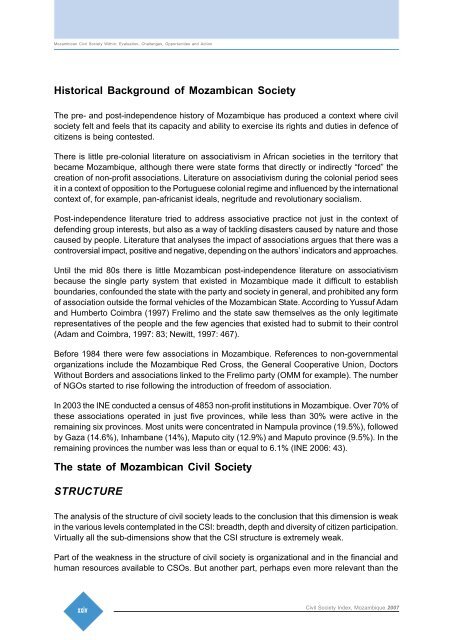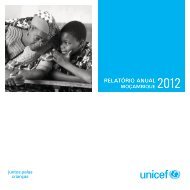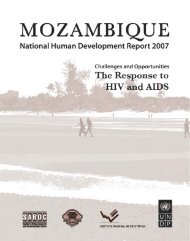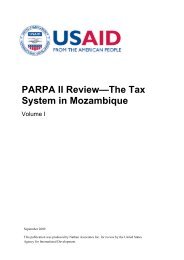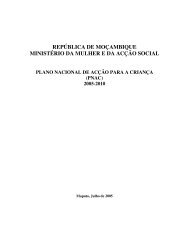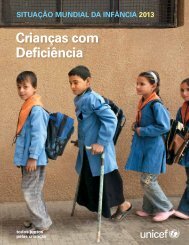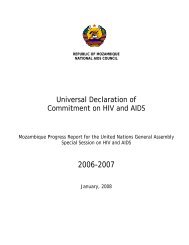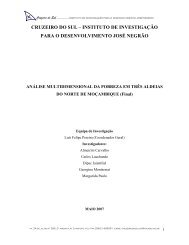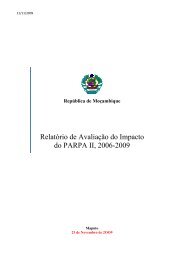Mozambican Civil Society Within: - UNICEF Mozambique - Home page
Mozambican Civil Society Within: - UNICEF Mozambique - Home page
Mozambican Civil Society Within: - UNICEF Mozambique - Home page
Create successful ePaper yourself
Turn your PDF publications into a flip-book with our unique Google optimized e-Paper software.
<strong>Mozambican</strong> <strong>Civil</strong> <strong>Society</strong> <strong>Within</strong>: Evaluation, Challenges, Opportunities and Action<br />
Historical Background of <strong>Mozambican</strong> <strong>Society</strong><br />
The pre- and post-independence history of <strong>Mozambique</strong> has produced a context where civil<br />
society felt and feels that its capacity and ability to exercise its rights and duties in defence of<br />
citizens is being contested.<br />
There is little pre-colonial literature on associativism in African societies in the territory that<br />
became <strong>Mozambique</strong>, although there were state forms that directly or indirectly “forced” the<br />
creation of non-profit associations. Literature on associativism during the colonial period sees<br />
it in a context of opposition to the Portuguese colonial regime and influenced by the international<br />
context of, for example, pan-africanist ideals, negritude and revolutionary socialism.<br />
Post-independence literature tried to address associative practice not just in the context of<br />
defending group interests, but also as a way of tackling disasters caused by nature and those<br />
caused by people. Literature that analyses the impact of associations argues that there was a<br />
controversial impact, positive and negative, depending on the authors’ indicators and approaches.<br />
Until the mid 80s there is little <strong>Mozambican</strong> post-independence literature on associativism<br />
because the single party system that existed in <strong>Mozambique</strong> made it difficult to establish<br />
boundaries, confounded the state with the party and society in general, and prohibited any form<br />
of association outside the formal vehicles of the <strong>Mozambican</strong> State. According to Yussuf Adam<br />
and Humberto Coimbra (1997) Frelimo and the state saw themselves as the only legitimate<br />
representatives of the people and the few agencies that existed had to submit to their control<br />
(Adam and Coimbra, 1997: 83; Newitt, 1997: 467).<br />
Before 1984 there were few associations in <strong>Mozambique</strong>. References to non-governmental<br />
organizations include the <strong>Mozambique</strong> Red Cross, the General Cooperative Union, Doctors<br />
Without Borders and associations linked to the Frelimo party (OMM for example). The number<br />
of NGOs started to rise following the introduction of freedom of association.<br />
In 2003 the INE conducted a census of 4853 non-profit institutions in <strong>Mozambique</strong>. Over 70% of<br />
these associations operated in just five provinces, while less than 30% were active in the<br />
remaining six provinces. Most units were concentrated in Nampula province (19.5%), followed<br />
by Gaza (14.6%), Inhambane (14%), Maputo city (12.9%) and Maputo province (9.5%). In the<br />
remaining provinces the number was less than or equal to 6.1% (INE 2006: 43).<br />
The state of <strong>Mozambican</strong> <strong>Civil</strong> <strong>Society</strong><br />
STRUCTURE<br />
The analysis of the structure of civil society leads to the conclusion that this dimension is weak<br />
in the various levels contemplated in the CSI: breadth, depth and diversity of citizen participation.<br />
Virtually all the sub-dimensions show that the CSI structure is extremely weak.<br />
Part of the weakness in the structure of civil society is organizational and in the financial and<br />
human resources available to CSOs. But another part, perhaps even more relevant than the<br />
xxiv<br />
<strong>Civil</strong> <strong>Society</strong> Index, <strong>Mozambique</strong> 2007


